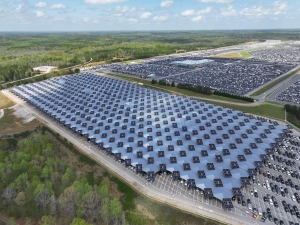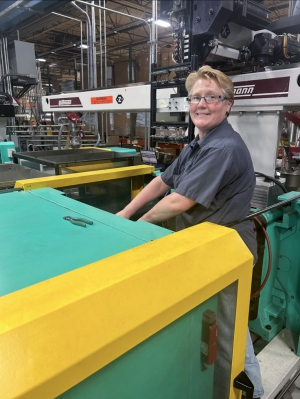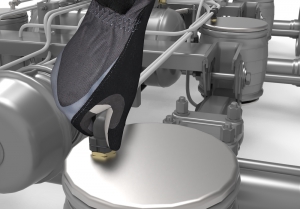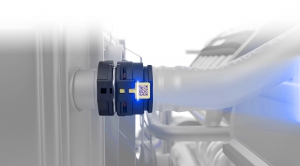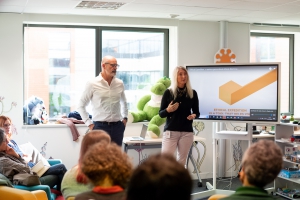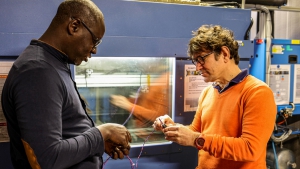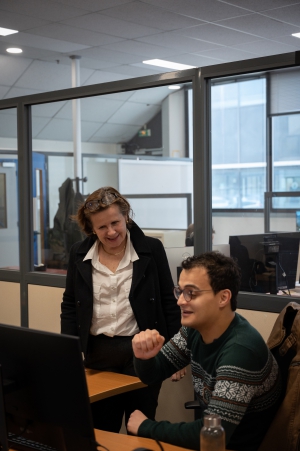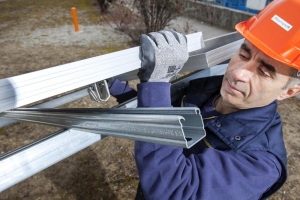Kia Partners with VPS on solar hail protection canopy in Georgia
WEST POINT, GEORGIA — A collaborative team of engineering, construction, and technology leaders is delivering one of the largest dual-purpose solar hail protection canopy projects in the United States, designed to protect vehicles at Kia’s West Point, Georgia, assembly plant — while also generating clean, renewable power.
Initiated after a hailstorm in March 2023 that damaged more than 13,000 vehicles at the plant, and caused millions in damage, the creative and eco-friendly solution has been confirmed by Georgia Power to be the largest Behind-The-Meter system in the state of Georgia.
The project brings together Vehicle Protection Structures (VPS), SolMotiv, Ancora Systems, and ARaymond Energies, who have come together to address a critical need for vehicle protection following a severe hailstorm in 2023. The new carport system combines fixed-tilt solar arrays with a fabric canopy, covering more than 3.2 million square feet of parking area and generating approximately 10 megawatts of solar power when complete.
“This project is a true team effort,” said Keith Busam, Vice President of Business Development and Sustainability for VPS. “By integrating VPS’s proven hail protection systems with solar expertise from SolMotiv and Ancora, and fastening solutions from ARaymond, Kia is not only protecting its vehicles but also advancing its sustainability goals.”
ARaymond’s Brenda Lee speaks about growing role of women in manufacturing, STEM fields
As we prepare to celebrate International Women's Day on Saturday, March 8, we spoke with Brenda Lee, a Process Development Technician for global fastener supplier ARaymond at their North American headquarters in Rochester Hills, Michigan. Brenda, who grew up and lives in Flint, Michigan, shared insights into her role at ARaymond, her journey in the manufacturing industry, and her perspective on what the future can hold for women entering the manufacturing and STEM industries.
Q&A with Brenda Lee, Process Development Technician at ARaymond
Q: What do you do at ARaymond? And what’s a typical day like in your job?
Brenda Lee: In my role as a Process Development Technician, I focus on optimizing and improving manufacturing processes. A typical day involves analyzing current production methods, identifying areas for enhancement, and implementing solutions to ensure efficiency and quality. This includes collaborating with die setters who set up the tools, after which our team processes the jobs, making necessary adjustments to achieve the desired outcomes.
Q: Can you tell us about your career path and how you arrived at your current position?
Brenda Lee: I joined ARaymond in 1998 after working at another automotive supplier, where I was involved in bumper assembly. When I first arrived, there were distinct roles for men and women, but I was determined to break those barriers. Despite being told I couldn't handle certain tasks, like lifting materials or die setting, I took the initiative to learn them and prove myself. Over time, I progressed from a production technician to materials handler, then to die setter, and now to Process Development Technician.
Q: What inspired you to pursue a career in manufacturing?
Brenda Lee: Originally, I studied criminal justice in college, aiming to follow in the footsteps of my grandfather, a police officer, and my uncle, a paramedic and firefighter. However, after witnessing some of the harsher realities of that field and heeding my grandfather's concerns, I decided to pivot. A cousin introduced me to opportunities in manufacturing and I found a new path that has been both challenging and rewarding.
Q: How has being a woman in a traditionally male-centered field impacted your career?
Brenda Lee: Navigating a male-dominated industry has certainly shaped my career and personal growth. Facing skepticism and resistance, I became more determined and focused. There were instances where my capabilities were doubted, and I had to continually prove myself. This journey has made me stronger and more resilient, but it's also highlighted the need for equal recognition and opportunities for women in the field.
Now with all the changes in recent years, there’s much more diversity in this field, but it was a struggle along the way. There were people who felt I didn’t belong. But as a self-taught and determined learner, I’ve managed to continue my growth in the industry. To me, it was the first time I was told “No, you can’t do that” that got me motivated. I was determined to make it work.”
Q: What advice would you give to young women considering careers in engineering or manufacturing?
Brenda Lee: It's essential to cultivate determination and resilience. Challenges and naysayers are inevitable, but using those obstacles as motivation can drive you forward.
Also, don't be discouraged by physical demands; there are always tools and methods that can make you work smarter and overcome those obstacles. Most importantly, believe in your capabilities and don't let others define your potential.
The biggest thing for me for women in the industry is a “mind over matter” mentality. You have to set your mind straight, and whatever is thrown at you, whatever people say, let it go, and use that as motivation to get to where you’re going.
Q: What are your career goals going forward?
Brenda Lee: I enjoy my current role as a Process Development Technician, but my next step to advance my career would be a supervisor role, and that’s an eventual goal. I’ve filled in for those roles in the past.
Q: How can the industry support and retain more women in STEM roles?
Brenda Lee: Encouragement and support from management are crucial. Providing women with the necessary tools, training, and opportunities to advance is essential. Early exposure to STEM programs can spark interest, but continuous support and mentorship are key to retention. Creating an environment where women's voices are heard and valued will foster innovation and diversity in the industry. I also encourage men in the workplace to speak up if women are being undervalued, as that can have a major impact.
I would also say to parents who have daughters to teach them at a young age that it’s OK for girls to be in sports and other activities that tend to be more male-dominated. Teach them to be a confident and strong-willed young woman, to be determined, not give up so quickly, and have an inner drive to get ahead.
Q: What efforts is ARaymond making to inspire and support women in STEM professions?
Brenda Lee: ARaymond has been moving in a positive direction with an approach that emphasizes fairness and diversity. There's a conscious effort to encourage women to pursue various roles within the company and to provide the support needed for their growth and development. There’s a recognition that women’s voices need to be heard, and their input taken seriously.
ARaymond launches new line of connectors for pneumatic systems in commercial vehicles
ARaymond, a global leader in fastening and assembly systems for more than a century, announced that it is expanding into the field of pneumatic systems for commercial vehicles — offering a full line of connectors, fasteners and tubes to be used as part of key vehicle systems such as braking and suspensions.
The new ARaymond pneumatics line, called AIRYOSA, will be showcased for the first time at the IAA Transportation 2024 gathering starting Sept. 17 and running through Sept. 22 in Hannover, Germany.
ARaymond’s leadership team said the AIRYOSA products expand on the company’s past knowledge and experience and brings it to a new sector.
“The cutting-edge AIRYOSA lineup breaks new ground for ARaymond and we’re excited about the path forward in the pneumatics sector. We are proud to release a new and complete set of products and solutions in the pneumatic market, leveraging our long-standing expertise in fluid handling for commercial vehicles,” said Gerald Vincent, ARaymond Global Commercial Vehicles Market Coordinator. “These products will provide improved safety, ergonomics, and sustainability during the assembly process and the vehicle’s lifetime.”
ARaymond: Fluid interfaces and fastening solutions are improving EV thermal management
By Sébastien Frasse-Sombet
Senior Global Product Manager, ARaymond
As the automotive industry continues to evolve and electric vehicles (EVs) become more mainstream, innovations are affecting all vehicle components, including the fasteners and assembly systems used.
One such system is thermal management, a critical element of an EV, with dozens of connection points in each vehicle. The EV and its battery pack must be adequately cooled to ensure safe and efficient operation. It’s essential to secure all fluid lines to avoid leakage inside a battery pack or near the vehicle’s electric components.
Autonomous driving functions are expected to increase this requirement. During autonomous driving, a vehicle’s ADAS computer is cooled by the same liquid that cools the battery. Loss of function can damage the calculator from overheating, potentially leading to an accident. As a result, OEMs are increasing demands for secure connections and product traceability.
In addition to helping automakers ensure EVs are as safe as possible, advances in fastener solutions for thermal management are also making the process of building EVs more ergonomic — allowing suppliers to tailor and customize parts for each requirement. The result is a better and safer electric vehicle for drivers.
Safety first
A key element of thermal management fluid interfaces is a reliable locking mechanism. This comes in many forms. Some quick connectors, when inserted, can provide visual, tactile, and audible confirmation — so an installer feels and hears when the connection is made.
Other options include the use of QR (quick-response) or DMC (datamatrix) codes, allowing for better traceability. QR codes are two-dimensional matrix barcodes invented in the mid-90s. They were initially created to track automotive parts during the assembly process and became widely used in consumer products in the 2000s.
DMC is also two-dimensional but square and can store a significant amount of information. For this reason, it’s becoming the preferred method of encoding data.
In either case, this data is available for review in the event of any concerns or maintenance issues with the vehicles. Such verification is critical for safety and traceability reasons, making identifying possible root causes of potential problems easier. Secured fasteners for thermal management systems and fluid line connections keep EV drivers and passengers safer, an essential goal for all automakers.
Better health
Advanced connection systems for EVs also mean improvements for the technicians building and installing these fastening solutions. This is because many connectors used on EVs have become low-push quick connectors — which means less insertion effort is required during installation.
This is important as it saves plant workers potential repetitive strain or musculoskeletal injuries from accessing the installation point continually throughout their shift.
Typically, these installation points can be challenging to access, increasing the chance of a faulty connection, which can lead to vehicle component damage or poor reliability. There’s also a significant number of connectors required in every EV.
Additionally, larger fluid lines are used, so a proper connection requires more force. When done manually, ergonomics are a concern. By simplifying the architecture of fastener installation, OEMs provide a safer workplace for employees assembling EVs while improving vehicle reliability.
Versatile designs
Automakers have specific requirements and specifications for their electric vehicle lineup. Special features and custom component designs have become essential. One such feature is lightweighting, especially for EVs where vehicle weight and range are significant.
Many custom designs are compressed in size so they fit into tight spaces. The trend toward smaller connectors allows for better space optimization and reduced weight. Part materials can be plastic or metal to serve the connection point best, whether for the battery pack or to seal in individual battery cells.
Suppliers can work with OEMs to offer environmentally friendly materials, eco-friendly designs, and a full lifecycle analysis of the parts. This allows suppliers to play an important role in helping OEMs reach their CSR goals. Custom designs further allow connections to be built for ease of assembly and serviceability, as well as with sustainability in mind. An improved sustainability model minimizes the OEM’s footprint while maximizing coolant flow.
While EVs are presenting new fastening challenges due to a focus on thermal management, the industry is rising to the challenge with products that improve vehicle safety, address ergonomic issues at the assembly level, and create customized solutions that will benefit the automakers and the environment.
Sébastien Frasse-Sombet is a Senior Global Product Manager for global automotive supplier ARaymond.
ARaymond CSR leader discusses sustainability, women in STEM careers
As we mark International Women’s Day this year on March 8, the theme for the 2024 global celebration is “Invest in Women; Accelerate Progress”. This theme represents the importance of companies shifting to a greener economic approach, while also recognizing that it’s critical to amplify the voices of women in these discussions.
One woman who is very familiar with these themes is Carole Neyrinck, Corporate Social Responsibility Manager for ARaymond, a global supplier of fastening systems for the automotive, energy, construction, agriculture, and healthcare industries.
ARaymond is based in France but has a U.S. headquarters in Rochester Hills, Michigan, and a presence throughout the globe in more than two dozen countries.
In this Q&A, Neyrinck shares her thoughts on her journey to her current leadership role at ARaymond, the overall state of women in the STEM industries, as well as how representation can be improved going forward:
Q: Tell us about your career journey, and how you got involved in sustainable development.
A: I spent three decades working as a biochemist engineer, after earning my bachelor’s and master’s degrees in this area. After a long career in the pharmaceutical industry, I joined ARaymond in my role as CSR manager starting in 2019. My job was always challenging, but I was able to raise my three children while working in production workshops and then implementing information systems. Soon after joining ARaymond to lead CSR, I began to focus on environmental goals, bringing clarity and structure in the approach so that the company acts in coordination for all projects in all departments. We work to limit our contributions to climate change, and with our partners to support them do the same. Some of them tried to push back, but I was strong and assertive, and trusted and encouraged by my management. I constantly develop my knowledge and skills, always learning and exploring new territories.
Q: Why is it important for companies to develop policies that recognize the impact of climate change?
A: When you think about climate change and the need to decarbonize, all companies are affected. We work to limit our contributions to climate change, and with our suppliers to help them do the same. Taking care of the environment consistently has become an increasingly strong emphasis each year, as it’s no longer an option to ignore it.
Q: As we mark International Women’s Day, how has being a woman impacted you in your career?
A: I’m thankful that I was raised in a family with a mother who was very attentive to being independent, and not relying on anyone for your living condition. Having that as my background, I didn’t really feel different from a man in terms of my skills and competencies. I was raised with principles of equity and equality.
When I started working, in the team of my peers, I was the only woman. And my direct reports were only men. I was very young, only 25, and the men were sometimes 50 years old. Some of them tried to push back, but I was strong and assertive, and skilled and competent. For me, if you are competent and skilled, you will be recognized. I always tried to be as competent as possible, always learning. And now I’ve passed these important lessons from my mother onto my own children.
Q: What barriers or obstacles do women face in advancing their careers within the CSR field, and how can these challenges be addressed?
A: For women in industries where they are underrepresented, it's all about being confident in yourself. I’ve rarely felt differences between men and women in work, and in those rare cases, I would always stand up for myself when I felt disrespected. In those few instances, I would not let this pass, and was straightforward to tell the person not to do it again.
In terms of career advancement, mentoring is a key element that can help women advance in their careers, and can help build on the core skills you bring into a job. You must always be learning, and have programs in place to support that learning.
Having supportive bosses and mentoring programs — like I do in my current role at ARaymond — has been a key element of my ability to grow throughout my career, and I make sure we continue to offer that mentoring to young men and women today. A supportive male boss can help usher in a generation of confident new leaders that’s a strong mix of men and women. And in CSR, the number of women taking on key roles is quite encouraging.
A combination of solid roots, strong skills development and being in a group that empowers you will lead to the amplification of women’s voices in key roles both on the factory floor and in the boardroom.
Q: How important is it for companies in all industries to embrace CSR goals; and how important is it for women to have key roles in that implementation?
A: CSR goals are essential because the world is becoming more disrupted and complex, and our global success relies on diverse collaboration. We must anticipate risks and see opportunities to get better prepared, so we’ll be better positioned for sustainability. We recently joined a pact of 150 business leaders in France to commit to decarbonization, and our efforts in automotive, energy, construction, agriculture, and construction are all moving in an eco-friendly direction.
Women must be included in the conversations about this critical decarbonization planning. By nature, women are more focused on taking care of something for the long-term. Women are a key asset for CSR, and men are also needed there — a diversity of opinions is the key. Beyond gender diversity, we also need a mix of ages and cultures offering their input.
Q: As a female in a leadership role, what are the key changes you aspire to see for future generations? How can we attract more women to engineering and other STEM fields?
A: I see the role of the engineer developing to be more about the capacity to develop solutions that contribute to the common good, and not simply fulfilling customer expectation.
There is a role for women to play in that. Engineers need to develop solutions with a systemic approach, and consider the social implications of these solutions and how to make a positive contribution to the environment. The role of engineer is changing, and is more than just technical. People who can embrace this approach will succeed, including women from the current and future generations.
ARaymond unveils new temperature sensors for EV and hybrid thermal management
ARaymond, a global leader in automotive fastening and assembly systems, has added temperature sensors to its thermal management offerings for electric and hybrid vehicles.
With over 155 years of industrial know-how and 30-plus years of automotive fluid handling expertise, ARaymond’s focus is now to purposefully contribute to the electric vehicle revolution. This means developing products and solutions that make assembly more productive, thermal management more efficient, and lifecycle more sustainable.
EV and Hybrid thermal management systems are increasingly demanding in terms of performance, space, efficiency, and safety. These entail accurate temperature control of the electric powertrain requiring more sensors in the cooling system. Most temperature sensors on the market have a metallic body making them bulky and heavy. As proprietary owners of their in-house manufacturing processes, ARaymond immediately saw an opportunity to leverage its plastic injection legacy to produce a notably lighter plastic-enclosed temperature sensor, fittingly responsive, for thermal application.
ARaymond’s Laurence Fayand working to close gender gaps through innovation, leadership
As we prepare to celebrate International Women’s day on March 8th, it provides us the opportunity to assess how far women have come in various fields and professions.
In the world of engineering and fastener design, ARaymond is one global firm that recognizes the importance of female voices in their current and future endeavors. In addition to actively recruiting talented female team members, they also recognize the importance of listening to women’s voices at the highest levels of business development.
Laurence Fayand, who serves as President and Managing Director of ARaymond’s Business Incubator and Accelerator, leads a team that is responsible for developing technologies of the future at ARaymond — including the latest advances in fastening, fluid handling portfolios, and data & digital service. ARaymond is based in France but has a U.S. headquarters in Michigan and a presence throughout the globe in more than two dozen countries. Fayand’s background prior to ARaymond includes serving as CFO at multiple technology companies including Kayentis and Tronics Microsystems, and a lengthy stint in key management roles at HP.
Fayand recently answered several questions about her role at the ARaymond Incubator, and why it’s important to grow the number of women in STEM roles as well as business/leadership positions.
ARaymond brings innovation, efficiency to solar panel installation
ROCHESTER HILLS, Mich. — Demand for solar photovoltaic (PV) systems is on the rise globally, in part due to the need to provide more electrical power at a lower cost and low CO2 emission.
According to the International Energy Agency (IEA) forecast for 2024, Renewable power capacity is set to expand by 50% between 2019 and 2024, led by solar PV that will alone account for almost 60% of the growth. Groud mount and rooftop PV installation is expected to grow from 630 GW to 1,500 GW globally by 2024.
One barrier to market growth is the high cost of panel installation. Standard mounting with typical nuts and bolts can stress the PV modules, leading to maintenance cost increases and durability concerns. Other challenges are:
- Carrying heavy tools around during assembly
- Installation time
- Safety issues caused by climbing on top of modules as well as potential damage to panel
- Loosening of panels requiring re-torque
ARaymond delivers solutions for solar
ARaymond’s panel clips simplify PV module assembly. They provide fast, easy installation in field operations, resulting in significant labor cost reduction compared to nuts and bolts.
The fastener installation requires no heavy tools and takes place underneath the system, eliminating the need to climb above the modules, reducing potential for employee injury and damage to the module. Clips have proven, long-term performance, and have been tested in both static and dynamic loading.
“With our clips, a customer in Australia recently set the world record for the fastest installation; a 130-Megawatt installation at 690 panels per person and per day (team of 3), with a slide and clip structure,” said Jean-Baptiste Chevrier, V.P. Sales & Marketing for ARaymond Energies.
Cable management is also a factor that may impact the overall installation and maintenance cost. Incorrect practices can lead to undesirable consequences, such as overheating.
Faulty PV wiring management practices are one of the leading technical failures encountered in PV projects, causing significant financial impact, sometimes more than 15 percent of the initial investment, according to Solar Bankability, a project funded by the European Commission’s Horizon 2020 program.
ARaymond’s dedicated selection of robust metal and plastic clips, cable straps and adaptors avoid mechanical stress and strain, excessive heat when bundled, and water intrusion when attaching cables over, or on the side of module edges or structure rails.
They ensure a long-term solar installation, and in turn reduce potential risk to PV project investment.
About ARaymond Energies
ARaymond Energies believes in the importance of renewable energies for our future and is committed to developing breakthrough technologies in order to make the assembly process easier, faster, cheaper. The headquarters of ARaymond Energies are in Grenoble, France, with sales offices around the globe. We take pride in being able to leverage the 150 years of expertise of the ARaymond Network to develop unique and meaningful solutions, while being able to produce them in large quantities and standardize them.
About ARaymond
With more than 7,000 employees in 25 countries around the world, the ARaymond Network designs, manufactures and markets assembly and fastening systems. Founded in 1865, this family business based in Grenoble, France, and inventor of the press stud, has always put human values at the heart of its success. ARaymond, based on the conviction that the wellbeing and empowerment of its collaborators is essential to its continued success. Guided by innovation and value creation, the ARaymond Network is today one of the global leaders in fastening and assembly solutions for many market segments.
— Press release courtesy of ARaymond
News Categories
Popular Tags
Search Reviews by Make

AutoTechReviews is your home for In-depth reviews of the latest cars, trucks, and SUVs; information on all the emerging vehicle technology; and breaking news from the world of NASCAR and other motorsports.
